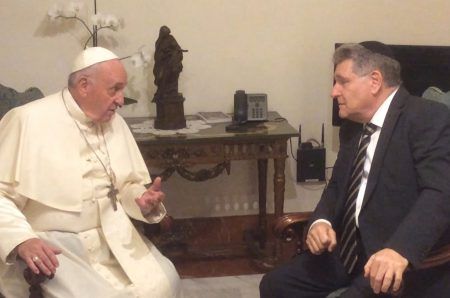- DialogikaDocuments and statementsThemes in Today's Dialogue
- News
- Members
- About
- Journal
- Meeting
December 11, 2019
POPE FRANCIS:
As I was saying, we have to keep our eyes wide open and not be misled by false narratives. What concerns me most right now is the great amount of prejudice and hatred that has spread throughout society. There are closed borders and closed hearts. Christmas is coming. For us Christians it is a messianic moment. And this means peace, coming together, and fraternity. Nonetheless, I see outbursts of hatred erupting in today’s culture: there are countries that are suffering from increasing antisemitism, borders are being closed to migrants, our brothers and sisters are not being welcomed.
Sometimes, I tell you, Abraham, I hear echoes of Hitler’s speeches from 1935-1936. That is why, with Christmas coming, I appeal, let us please have peace! What do you think about this?
RABBI SKORKA:
I totally agree. When we take a look at the map of the world today, we can see unprecedented violence in Latin America. I understand that there is social imbalance and social inequality in many countries in Latin America; equality and social justice have still not been achieved. But if we examine history, the only way to solve all these problems is by the path of peace. ... In any conflict, despite all the good intentions to solve problems, when the solution comes through violence it is definitely not a real resolution of the conflict.
 POPE FRANCIS
POPE FRANCIS
In other words, [using violence] is promoting hatred. And hatred always brings death. Hatred brings death, wars, revenge, separations, and great injustice, doesn’t it? The call of Christmas for us Christians is the messianic call, no? As one of the Minor Prophets says, the Messiah shall be peace or “He will be peace” [Micah 5:5].
RABBI SKORKA:
It is the same vision that we [Jews] have of the Messianic Age. One of the most important passages is in Isaiah, when he says something like, and in the field they will graze together, the lion with the little goat [Isaiah 11:6] and goes on, a toddler will put his hand in a viper’s nest and not be harmed [Isaiah 11:8]. And how does that chapter start? It begins by speaking about a descendent of the house of David [Isaiah 11:1], that is to say, the messianic times. There is a discussion in rabbinic literature [b. Berakhot 34b, Sifra Beḥukotai 2]: whether it is necessary for nature itself to be transformed in order to attain a time of peace; whether the lion should become herbivorous.
POPE FRANCIS
Ah, is this a rabbinic text?
RABBI SKORKA:
It is a question for discussion. Yes, this a rabbinic text. What does Maimonides, who for us is the great teacher, say? The world is not going to be transformed. It is in this human reality that a reality of peace is possible.
Antisemitism, violence in Latin America, egregious acts of antisemitism in the United States ... So much violence, just to give a few examples. So much violence worldwide.
POPE FRANCIS
With respect to messianic times, we are both looking in the same direction. You are waiting for the Messiah to come, and I am waiting for his return. But it is the same thing.
Jesus promised to come back; that is why I am waiting for his return. And you are waiting for the Messianic Age that God promised, waiting for it to come. But we are always looking toward the same thing: to the kingdom of peace, of justice, of love, of harmony where people can praise God …
RABBI SKORKA
… in the most profound sense. True interreligious dialogue happens when we can share things from different perspectives. You just mentioned peace; you said we are both waiting for peace, that we are waiting for the same thing but from different perspectives. And in this understanding, the good thing is that when each other’s religious celebrations come, each of us can have a feeling of deep empathy toward what the other is living. In the same way, you had when you twice visited Benei Tikva, the synagogue in Buenos Aires. And I recently reviewed the things you said. Impressive: how you spoke in the first person plural, how you included yourself in what we were doing, our prayers asking for God’s forgiveness. “We … We.” With sincerity. And so in the same vein, I want to say to you: May God bless us all so that Christian people’s celebration of Christmas will reinvigorate a deep spirituality and—what’s most important—the re-creation of great hope.
POPE FRANCIS
Hope for peace, so be it! Amen!
RABBI SKORKA
Amen!